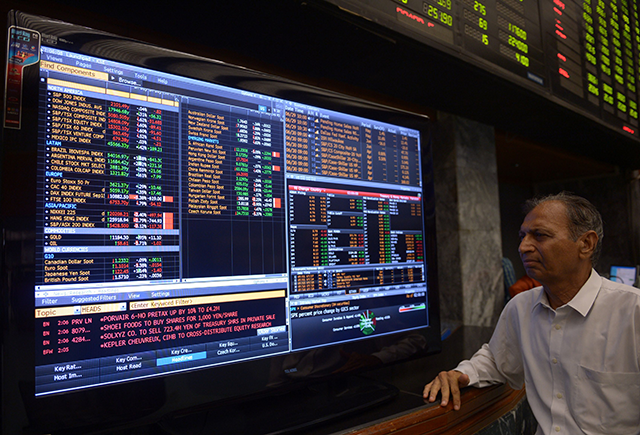Overheating economy takes toll on PSX
Growing concerns wiped off 17% market capitalisation in past four months

The Pakistan Stock Exchange (PSX) - a barometer to gauge performance of the domestic economy - is melting down due to overheating of the national economy in wake of spike in import payments amid ballooning global commodity prices.
Growing economic concerns caused the benchmark KSE-100 Index to dip 10% (or 4,897 points) to six-month low level of 43,829 points and wiped out 17% market capitalisation (total value of all companies listed at PSX) over the past four months to $45 billion on Monday.
In June 2021, the index stood at the then four-year high level of 48,726 points and market capitalisation amounted to $54 billion as the government presented a pro-growth and business friendly budget, according to PSX data.
Experts anticipate that breakthrough in advance level talks between Pakistan and the International Monetary Fund (IMF) in Washington and resumption of $6 billion loan programme would bring stability in the market.
“Pakistan’s stocks are falling…(despite) record earnings growth of 60% last year (FY21),” Topline Securities CEO Muhammad Sohail said on his official Twitter handle on Monday.
He recalled that market capitalisation peaked at $100 billion and the benchmark KSE-100 index hit all-time high of close to 53,000 points in 2017. “Fear of foreign selling, falling Pakistani rupee and rising interest rate (has made the market volatile),” he said.
“All eyes on IMF,” Ismail Iqbal Securities Head of Research Fahad Rauf said in a short commentary.
The benchmark Index hit third lowest level of the calendar year 2021 at 43,829 points on Monday in the wake of “US exit from Afghanistan, MSCI’s downgrade of PSX, large current account deficit, rupee depreciation, price boom of global commodities and 25 basis points hike in interest rate,” he said.
Earlier in April 2021, the stock market hit second lowest level of the year at 43,548 points during third wave of Covid-19 pandemic in Pakistan. It hit the lowest level of 42,780 points around Senate elections that took place in March, he said.
Since June 2021, the market has been witnessing mounting selling pressure coupled with rising import payment and widening current account deficit. The import payments grew $1 billion to record high of $6.57 billion in August 2021 compared to $5.57 billion in the previous month of July. The import payments remained elevated near August’s level in September as well.
The surge in import bill was largely recorded due to spike in global commodity prices. The crude oil benchmark, Brent, hit multiyear high of $84.56 per barrel at world markets on Monday. Similarly, prices of LNG, coal and food (wheat, sugar and cooking oil) have continued to balloon over the past few months in the global market in wake of reopening of global economies.
The developments kept inviting selling pressure at the PSX.
Besides, worsening of financial crisis in Afghanistan also took a toll on the domestic economy. Traders from both sides of the Durand line arranged essential goods including food for the bordering country through Pakistan. This also partially added to the growth of Pakistan’s import bill.
The rising demand for US dollars to pay for the import bill adversely impacted the rupee which fell to record low of Rs171 against the US dollar in the inter-bank market last week.
The overheating situation encouraged the central bank to take measures to cool down the economy. Accordingly, it hiked up the benchmark interest rate by 25 basis points to 7.25% in September after keeping it unchanged for the prior 15 months (July 2020 - September 2021).
Published in The Express Tribune, October 12th, 2021.
Like Business on Facebook, follow @TribuneBiz on Twitter to stay informed and join in the conversation.



















COMMENTS
Comments are moderated and generally will be posted if they are on-topic and not abusive.
For more information, please see our Comments FAQ